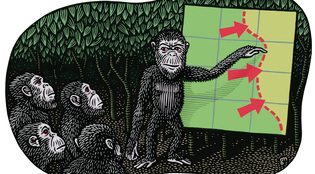 loading
loading
FindingsLand grab Gregory NemecView full image
David Watts has seen chimpanzees attack. Over 15 years of summers and sabbaticals spent at Ngogo, in Uganda's Kibale National Park, the anthropology professor has watched and followed many times as the males of the world's largest known chimpanzee population fall into single file to patrol the borders of their territory. The males are normally boisterous, but on patrol, they are silent. And if they encounter a vulnerable chimp from a neighboring community, they strike. "They look for opportunities to attack their neighbors," Watts says. "We've seen serious attacks where they've found females and grabbed their infants and killed them, or found adult males and killed them." Watts and his colleagues at Ngogo recently posited an explanation in Current Biology. The attacks, they hypothesize, aim to drive back other groups of chimpanzees, thereby allowing the 150-plus Ngogo chimps to control more space. "If they can be successful and expand their own territories, then they have more food, and life is easier," Watts says. But the researchers don't know how fully the chimps understand their own actions. The news media, seeing parallels between chimp behavior and the history of human territorial expansion, have been quick to portray the patrols as "warfare," but Watts isn't convinced. It's unlikely that chimps can actually make plans to kill, he says, only to attack. "I don't think they can set out to say, 'If I find another chimpanzee, I'm going to do something to him to ensure his life ends.'" He adds, "I also worry that if we start to throw around terms like 'murder,' we're passing some kind of moralistic judgment on chimpanzees. But they are not us."
The comment period has expired.
|
|